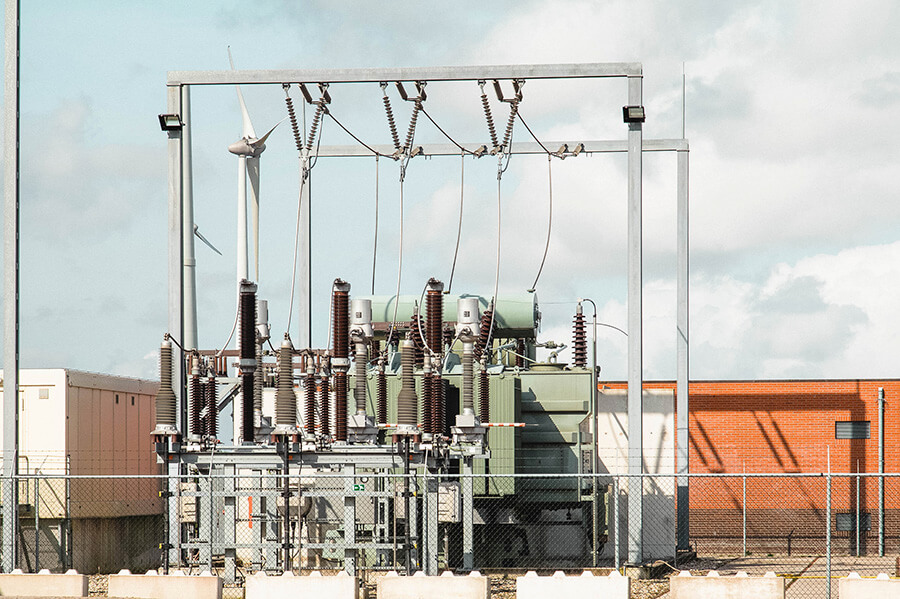Power transformers are an essential part of the modern electric power industry. Their reliability ensures power supply to large industrial facilities and residential consumers. In this article we will learn about transformer oil, which is an important part of transformer insulation system, and oil maintenance.
Let’s start with oil functions. Oil in a transformer isolates active parts and removes heat generated in the transformer during operation. Oil mitigates some of the negative processes that may result in faults. Therefore, oil condition should be regularly monitored and maintained.
Oil maintenance: oil testing and analysis
Transformer visual inspection includes testing oil top layer temperature. This is done by heat signal rods and thermometers. The standard value of this parameter is 95 °C. If oil temperature exceeds this value, it is recommended to reduce transformer load.
The simplest and the least labor-intensive test of transformer oil is the dielectric strength test. It tests dielectric breakdown voltage, as well as the presence of particulate impurities and moisture, but only visually.
Oil Screen test is more complex. It includes the previous tests in addition with testing flash point and acid number. The last parameter shows the degree of oil aging, since this process is always associated with an increase of acidic compounds. Oil Screen is recommended after repairs to insure proper maintenance.
The full package of tests analyzes all parameters and characteristics of oil. It is valuable for assessing new and regenerated oil.

Transformer oil maintenance
Tests results demonstrate the current state of the oil. These results are compared to the standard values that are test limits recommended by international organizations. When test results do not exceed the standard limits, the oil performs well, protecting the transformer from overheating and breakdown. If oil parameters exceed the standard values, it is regenerated or replaced with new oil.
In the absence of serious structural changes, transformer oil can be restored by cleaning and drying in the UVM units. The aging products can be removed by regeneration in CMM-R units. GlobeCore regeneration equipment processes oil directly in the transformer, without switching the transformer off-line. In practice, the restoration of oil is possible when its acid number is below 0.4 mg KOH/g. Well scheduled regeneration program prolongs oil service life and also the life of the transformer.
Regular oil maintenance includes preventive measures to reduce moisture content and oxidation. For prevention and protection against these negative factors, a transformer is equipped with additional devices, such as thermosiphon rods and air filters, as well as special nitrogen protection and film coatings.
An important part of oil maintenance is additive refill. Though new oil contains resins, which act as antioxidants, their quantity decreases with time, and special additives are introduced to increase antioxidant stability.
Oil maintenance for hydraulic systems and equipment

A hydraulic drive is a drive that converts energy of a hydraulic fluid to power mining and road construction machinery. It is also applied in machine-tool construction, aviation and automotive industry. Reliability and durability of hydraulic drive is ensured by good quality of hydraulic oil and oil maintenance.
Why does hydraulic oil deteriorate?
During operation of hydraulic machinery, moisture may enter hydraulic oil from poor joint connections, solid particles may get into oil as a result of wear of metal parts, dust may enter from the environment. Foreign substances in the oil clog the entire system and cause failures. These can result in unscheduled downtime and expensive repairs.
Oil maintenance: which approach to choose?
For hydraulic machines and equipment, the condition of oil and oil maintenance is extremely important. A correctly chosen strategy allows to reduce financial expenses on the following:
- Purchase of fresh oil;
- Disposal of used oil;
- Unplanned repairs.
Unfortunately, the common approach is to simply replace used hydraulic oil that reaches a certain (often critical) degree of pollution with new. The owners of equipment rely on stationary filters in the oil system, but such filters are not always capable to solve the problem. One of the reasons is using new oil contaminated during long-term storage. The second factor that limits the effectiveness of stationary filters is their filtration fineness. While capturing the largest particles, the filters let through the smaller ones that can still cause significant damage to the hydraulic system.
Therefore, hydraulic oil maintenance must include at least three mandatory processes:
- Oil Filtration before use in a system.
- Determining the degree of contamination.
- Regular regeneration
Methods of hydraulic oil cleaning
Hydraulic oils are cleaned with the help of the following forces:
- Gravitational;
- Magnetic;
- Electrostatic;
- Centrifugal.
The principle of gravitational cleaning is based on gravity which brings the contaminants to the bottom of the oil tank. Magnetic cleaning removes metal impurities with the size of 0.5-5 microns. Electrostatic cleaning draws impurities that are charged due to friction with oil. The fluid passes between two electrodes that attract oppositely charged particles. Centrifugal cleaning separates heterogeneous systems under the influence of centrifugal forces.
SELECTING FILTERS
When choosing filters for the hydraulic system, it is necessary to take into account many factors, such as:
- Size of equipment;
- Sensitivity of equipment to contamination;
- Degree of reliability;
- Type of hydraulic fluid;
- Operating conditions.
Comprehensive solution from GlobeCore
GlobeCore offers a compact and energy efficient equipment for hydraulic oil maintenance, which treats hydraulic fluid by filtration, heat and vacuum, adsorption, etc. Regular oil maintenance with CMM units helps to:
- Extend the service life of equipment;
- Improve its operational reliability;
- Reduce costs on purchase of fresh oil and used oil disposal.
